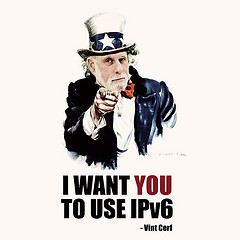All IPv6 Internet, All the time

Network administrators have long known that we're running out of IPv4 addresses. But, IPv6, the next generation Internet protocol, adoption has remained slow. Until now, now many of the major ISPs, network vendors, and Web sites have publicly committed to supporting IPv6 later this year.
In a promising sign of things getting better for IPv6, the Internet Society has announced that "Major Internet service providers (ISPs), home networking equipment manufacturers, and web companies around the world are coming together to permanently enable IPv6 for their products and services by 6 June 2012."
It's well past time. Asia ran out of IPv4 addresses in April 2011. Europe will run out this summer and North America will see its last unassigned IPv4 address in the summer of 2013.
So why have we been so slow? It's not that IPv6 doesn't work. It works great. That was proven out in June 2011 during the World IPv6 Day test and the Internet did just fine with the most IPv6 ever. So why haven't we moved faster?
Well, for starters, IPv6 has faced a chicken or the egg problem: Which would come first? The users? The ISPs? Web sites? The network equipment manufacturers? For IPv6 to really fly someone had to be first and no was willing to make the first move. Another factor, which can never be taken too lightly, is that converting to IPv6 frequently requires new network equipment, IPv6 training and a host of other concerns that require funding. Now, though as the last of the IPv4 addresses disappear, everyone is finally starting to pay attention and deliver the goods and the funding to make IPv6 happen.
In a statement, the Internet Society's CTO, Leslie Daigle, said, "The fact that leading companies across several industries are making significant commitments to participate in World IPv6 Launch is yet another indication that IPv6 is no longer a lab experiment; it's here and is an important next step in the Internet's evolution. And, as there are more IPv6 services, it becomes increasingly important for companies to accelerate their own deployment plans."
What this means, exactly, according to the Internet Society is that ISPs participating in World IPv6 Launch will enable IPv6 for enough users so that at least 1% of their wireline residential subscribers who visit participating websites will do so using IPv6 by 6 June 2012. These ISPs have committed that IPv6 will be available automatically as the normal course of business for a significant portion of their subscribers."
ISPs who've signed on so far are AT&T, Comcast, Free Telecom, Internode, KDDI, Time Warner Cable, and XS4ALL. Other ISPs who haven't signed on, but already have a significant IPv6 presence includes IPv6 specialist ISP Hurricane Electric and Verizon. In addition, content delivery network (CDN) providers Akamai and Limelight will be enabling IPv6 throughout their infrastructure.
The hardware providers who've committed to supporting IPv6 by default through their range of their home router products are Cisco and D-Link. All the major network equipment vendors already support IPv6 on their current business lines.
Four of the world's biggest Web sites, Bing, Facebook, Google, and Yahoo have also committed to IPv6. For them, this will mean enabling IPv6 on their main Web sites. So, for example, while the main Yahoo search site will be IPv6 accessible, its photo-library and sharing site, Flickr, might not be IPv6 compliant in June.
Google, at least, will be doing more though. According to Erik Kline, a Google IPv6 Software Engineer, "For Google, World IPv6 Launch means that virtually all our services, including Search, Gmail, YouTube and many more, will be available to the world over IPv6 permanently."
So, what does this mean for you as an ordinary Internet user? Nothing. You can still use your same PC, Web browser, Wi-Fi access point (AP), whatever. As the changeover to IPv6 slowly continues you shouldn't notice a thing. By the time you need IPv6 it will have been baked in to your equipment for years if not decades.
The shift over from IPv4, the Internet's old network protocol, to IPv6 is purely an issue for people who work with networks at a technical level and for companies that need new IP addresses for their Web sites. For Joe or Jane User, you'll probably never notice a thing. It's the network engineers and administrators who will be sweating the details.
By decade's end the entire online world will be available over IPv6. In the meantime, though, we're still generally taking small steps to adopting the protocol. This Internet Society news, though, represents a big step in the right direction.
Vince Cerf IPv6 image by blacknight, CC 2.0.
Related Stories:
Facebook, Google, Bing, Yahoo to enable IPv6 on June 6, 2012
ICANN takes control of Internet Time Keeping
Cisco launches new routers aimed at wireless carriers
Hurricane Electric takes its IPv6 expertise to the datacenter
